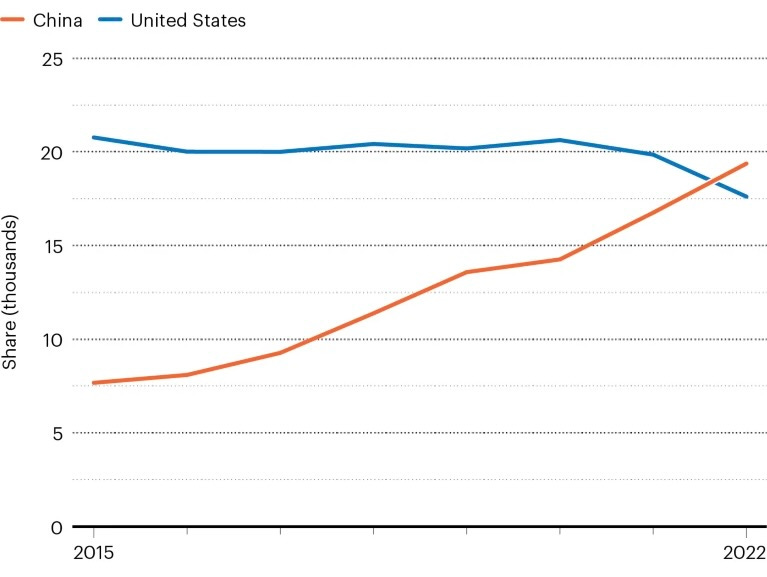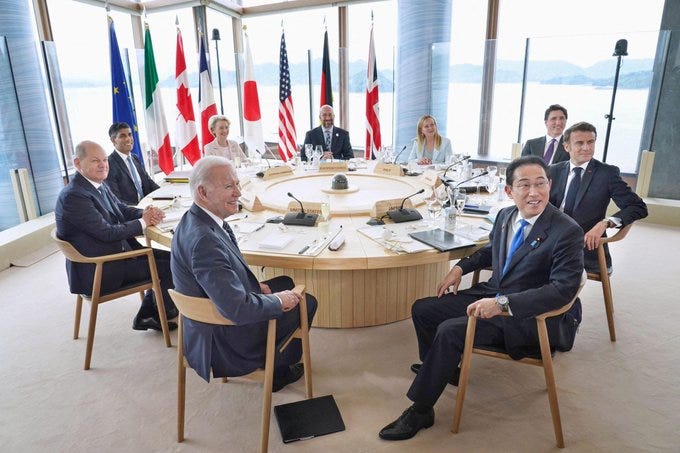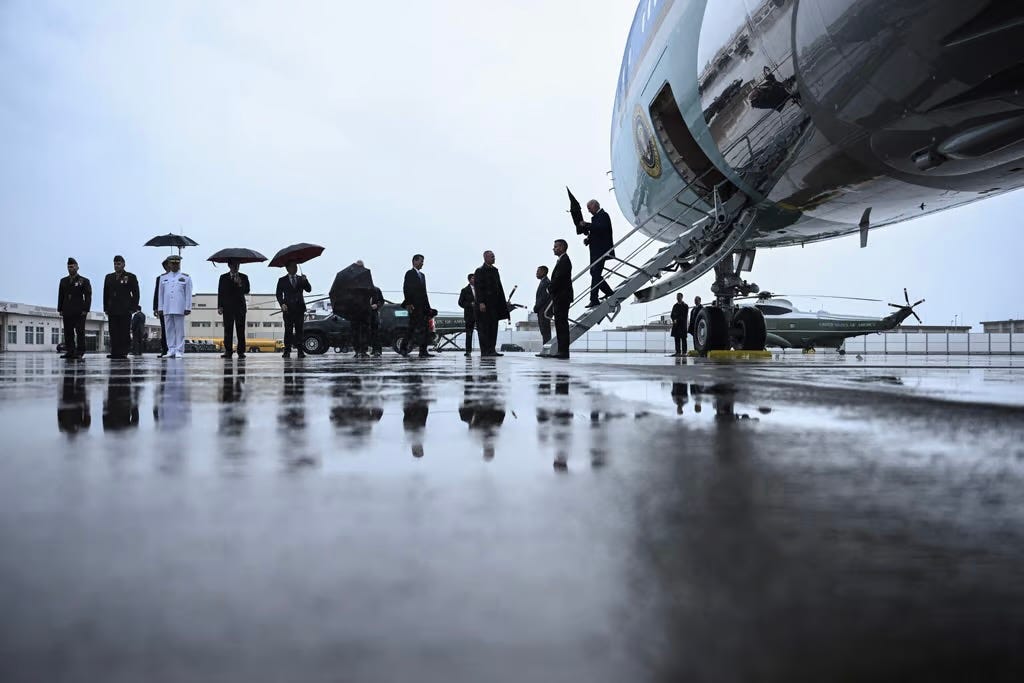Godzilla Squad
China science surpasses US, G7 status quo keeps changing, G7 China hype Q&A, G7 hypes fears over Taiwan, Godzilla sQuad
UPDATE: For the first time, China has overtaken the United States as the number one ranked country or territory for contributions to research articles published in the Nature Index group of high-quality natural-science journals.
We, the Leaders of the Group of Seven (G7), support Ukraine for as long as it takes and support a free and open Indo-Pacific and oppose any unilateral attempts to change the status quo by force or coercion.
The G7 makes high-sounding claims about “promoting a peaceful, stable and prosperous world”, but what it does is hindering international peace, undermining regional stability and curbing other countries’ development.
The threat of losing Taiwan is dividing allies at Hiroshima summit. Beyond the inevitably bland diplomatic lines of a summit communique — getting consensus on meaningful security measures for the Indo-Pacific region will be hard, even in the symbolic setting of Hiroshima.
The Quad is committed to supporting infrastructure, maritime security, public-private partnership, climate, health, critical and emerging technologies, and space.

China overtakes United States on contribution to research in Nature Index
For the first time, China has overtaken the United States as the number one ranked country or territory for contributions to research articles published in the Nature Index group of high-quality natural-science journals. Data on author affiliations from the 82 journals tracked by the Nature Index show that China had a Share of 19,373 from January to December 2022, compared with 17,610 for the United States.
A country’s Share takes into account the percentage of authors from that nation on each paper published in Nature Index journals; an article published entirely by China-based researchers would yield a Share of 1 for China. Since the Nature Index was first introduced in 2014, China’s Share has been rapidly gaining ground, and it was the leading country in the physical sciences and chemistry in 2021.
The latest data — a snapshot of the database taken in April, ahead of the full release of 2022 data in the 2023 Nature Index annual tables — suggest that China also overtook the United States in Earth and environmental sciences for the first time. This leaves only one natural-sciences category — life sciences — in which it is still trailing. Different measures of scientific performance have been pointing to a shift in the national balance of global science since the mid-2010s: a 2018 US National Science Foundation data set showed that China published the largest number of papers, for example. Between 2018 and 2020, Chinese research comprised more of the top 1% of the most frequently cited papers than did US research.
China's Share, a fractional count of author affiliations in Nature Index publications, has been rising rapidly since 2015. The United States, meanwhile, had a relatively stable share until 2020, but has fallen back since.
Caroline Wagner, a science and policy researcher at the Ohio State University in Columbus, who has published research suggesting that China has overtaken the United States on top-cited papers, says that, when measured on “simple bibliometrics like productivity and citations, China has outperformed expectations”.
The Nature Index data do show that China has still a way to go before it catches the United States on Count, a raw sum of all articles in the database that have at least one author from a particular country. In the same January to December 2022 window, the United States had a Count of almost 25,200 articles, compared with slightly more than 23,500 for China.
Read more here.
G7: “as long as it takes”
Preamble
We, the Leaders of the Group of Seven (G7), met in Hiroshima for our annual Summit on May 19-21, 2023, more united than ever in our determination to meet the global challenges of this moment and set the course for a better future. Our work is rooted in respect for the Charter of the United Nations (UN) and international partnership.
We are taking concrete steps to:
support Ukraine for as long as it takes in the face of Russia’s illegal war of aggression;
strengthen disarmament and non-proliferation efforts, towards the ultimate goal of a world without nuclear weapons with undiminished security for all;
coordinate our approach to economic resilience and economic security that is based on diversifying and deepening partnerships and de-risking, not de-coupling;
drive the transition to clean energy economies of the future through cooperation within and beyond the G7;
launch the Hiroshima Action Statement for Resilient Global Food Security with partner countries to address needs today and into the future; and
deliver our goal of mobilizing $600 billion in financing for quality infrastructure through the Partnership for Global Infrastructure Investment (PGII)
as outlined in the reference documents of this Communique.
We are determined to work together and with others to:
support a free and open Indo-Pacific and oppose any unilateral attempts to change the status quo by force or coercion;
foster a strong and resilient global economic recovery, maintain financial stability, and promote jobs and sustainable growth;
accelerate achievement of the Sustainable Development Goals (SDGs), recognizing that reducing poverty and tackling the climate and nature crisis go hand in hand;
promote the evolution of the Multilateral Development Banks (MDBs);
strengthen our partnerships with African countries and support greater African representation in multilateral fora;
preserve the planet by accelerating the decarbonization of our energy sector and the deployment of renewables, end plastic pollution and protect the oceans;
deepen cooperation through Just Energy Transition Partnerships (JETPs), the Climate Club and new Country Packages for Forest, Nature and Climate;
invest in global health through vaccine manufacturing capacity worldwide, the Pandemic Fund, the future international agreement for pandemic prevention, preparedness and response, and efforts to achieve universal health coverage (UHC);
cooperate on international migration and strengthen our common effort to fight the trafficking and smuggling of human beings; and
advance international discussions on inclusive artificial intelligence (AI) governance and interoperability to achieve our common vision and goal of trustworthy AI, in line with our shared democratic values.
2. We will champion international principles and shared values by:
upholding and reinforcing the free and open international order based on the rule of law, respecting the UN Charter to the benefit of countries, large and small;
strongly opposing any unilateral attempts to change the peacefully established status of territories by force or coercion anywhere in the world and reaffirming that the acquisition of territory by force is prohibited;
promoting universal human rights, gender equality and human dignity;
reiterating the importance of multilateralism including the role of UN and international cooperation in promoting peace, stability and prosperity; and
strengthening the rules-based multilateral trading system and keeping pace with the evolution of digital technologies.
3. We will work with our international partners to achieve a world that is human-centered, inclusive and resilient, leaving no one behind. In that spirit, we welcomed the participation of the Leaders of Australia, Brazil, Comoros, Cook Islands, India, Indonesia, Republic of Korea, and Vietnam.
Ukraine
4. We once again condemn in the strongest possible terms the war of aggression by Russia against Ukraine, which constitutes a serious violation of international law, including the UN Charter. We reaffirm our unwavering support for Ukraine for as long as it takes to bring a comprehensive, just and lasting peace.
Disarmament and Non-proliferation
5. Together with the G7 Leaders’ Hiroshima Vision on Nuclear Disarmament, we express our commitment to achieving a world without nuclear weapons with undiminished security for all, through taking a realistic, pragmatic, and responsible approach. We reaffirm the importance of disarmament and non-proliferation efforts to create a more stable and safer world.
Indo-Pacific
6. We reiterate the importance of a free and open Indo-Pacific, which is inclusive, prosperous, secure, based on the rule of law, and that protects shared principles including sovereignty, territorial integrity, peaceful resolution of disputes, and fundamental freedoms and human rights. We underscore our commitment to strengthen coordination with regional partners, including the Association of Southeast Asian Nations (ASEAN) and its member states. We reaffirm our unwavering support for ASEAN centrality and unity and our commitment to promoting cooperation in line with the ASEAN Outlook on the Indo-Pacific. We also reaffirm our partnership with Pacific Island countries and reiterate the importance of supporting their priorities and needs in accordance with the Pacific Islands Forum’s 2050 Strategy for the Blue Pacific Continent.
Regional Affairs
50. We stand together on core foreign policy and security challenges to build a more secure and prosperous future.
51. We stand together as G7 partners on the following elements, which underpin our respective relations with China:
We stand prepared to build constructive and stable relations with China, recognizing the importance of engaging candidly with and expressing our concerns directly to China. We act in our national interest. It is necessary to cooperate with China, given its role in the international community and the size of its economy, on global challenges as well as areas of common interest.
We call on China to engage with us, including in international fora, on areas such as the climate and biodiversity crisis and the conservation of natural resources in the framework of the Paris and Kunming-Montreal Agreements, addressing vulnerable countries’ debt sustainability and financing needs, global health and macroeconomic stability.
Our policy approaches are not designed to harm China nor do we seek to thwart China’s economic progress and development. A growing China that plays by international rules would be of global interest. We are not decoupling or turning inwards. At the same time, we recognize that economic resilience requires de-risking and diversifying. We will take steps, individually and collectively, to invest in our own economic vibrancy. We will reduce excessive dependencies in our critical supply chains.
With a view to enabling sustainable economic relations with China, and strengthening the international trading system, we will push for a level playing field for our workers and companies. We will seek to address the challenges posed by China’s non-market policies and practices, which distort the global economy. We will counter malign practices, such as illegitimate technology transfer or data disclosure. We will foster resilience to economic coercion. We also recognize the necessity of protecting certain advanced technologies that could be used to threaten our national security without unduly limiting trade and investment.
We remain seriously concerned about the situation in the East and South China Seas. We strongly oppose any unilateral attempts to change the status quo by force or coercion.
We reaffirm the importance of peace and stability across the Taiwan Strait as indispensable to security and prosperity in the international community. There is no change in the basic positions of the G7 members on Taiwan, including stated one China policies. We call for a peaceful resolution of cross-Strait issues.
We will keep voicing our concerns about the human rights situation in China, including in Tibet and Xinjiang where forced labor is of major concern to us. We call on China to honor its commitments under the Sino-British Joint Declaration and the Basic Law, which enshrine rights, freedoms and a high degree of autonomy for Hong Kong.
We call on China to act in accordance with its obligations under the Vienna Convention on Diplomatic Relations and the Vienna Convention on Consular relations, and not to conduct interference activities aimed at undermining the security and safety of our communities, the integrity of our democratic institutions and our economic prosperity.
We call on China to press Russia to stop its military aggression, and immediately, completely and unconditionally withdraw its troops from Ukraine. We encourage China to support a comprehensive, just and lasting peace based on territorial integrity and the principles and purposes of the UN Charter, including through its direct dialogue with Ukraine.
52. There is no legal basis for China’s expansive maritime claims in the South China Sea, and we oppose China’s militarization activities in the region.
53. We strongly condemn North Korea’s unprecedented number of unlawful ballistic missile launches.
54. We remain deeply concerned about the deteriorating security, humanitarian, human rights, and political situation in Myanmar.
55. We note with grave concern increased threats to stability and the dire humanitarian and economic situation in Afghanistan.
56. We reiterate our clear determination that Iran must never develop a nuclear weapon.
57. Iran must stop supporting Russia’s war of aggression against Ukraine. In particular, we call upon Iran to cease transferring armed UAVs, which have been used to attack Ukraine’s critical infrastructure and kill Ukrainian civilians.
Read more here.
G7 China Hype Q and A
Q: It has been reported that the G7 Hiroshima Leaders’ Communiqué and other documents adopted at the G7 Hiroshima Summit contain comments designed to hype up China-related issues, including irresponsible comments on the situation in the Taiwan Strait and accusations regarding the East China Sea, the South China Sea, Hong Kong, Xinjiang, Tibet and China’s nuclear power, professed G7 opposition to any unilateral attempts to change the status quo and claims about “economic coercion” that allude to China. What is China’s comment?
A: The G7 makes high-sounding claims about “promoting a peaceful, stable and prosperous world”, but what it does is hindering international peace, undermining regional stability and curbing other countries’ development. That simply shows how little international credibility means to the G7. Despite China’s serious concerns, the G7 used issues concerning China to smear and attack China and brazenly interfere in China’s internal affairs. China strongly deplores and firmly opposes this and has made serious démarches to the summit’s host Japan and other parties concerned.
Taiwan is China’s Taiwan. Resolving the Taiwan question is a matter for the Chinese, a matter that must be resolved by the Chinese. The one-China principle is the solid anchor for peace and stability in the Taiwan Strait. The G7 keeps emphasizing cross-Strait peace, and yet says nothing about the need to oppose “Taiwan independence”. This in effect constitutes connivance and support for “Taiwan independence” forces, and will only result in having a serious impact on cross-Strait peace and stability. No one should underestimate the determination, resolve and capability of the Chinese people in safeguarding China’s sovereignty and territorial integrity.
Affairs related to Hong Kong, Xinjiang and Tibet are purely China’s internal affairs. China firmly opposes interference by any external force in those affairs under the pretext of human rights. The G7 needs to stop pointing fingers at China on Hong Kong, Xinjiang and Tibet and take a hard look at their own history and human rights record.
China is a firm defender of and contributor to international maritime rule of law. The East China Sea and the South China Sea have remained overall stable. Relevant countries need to respect regional countries’ efforts to uphold peace and stability and stop using maritime issues to drive a wedge between regional countries and incite bloc confrontation.
As for “economic coercion”, the massive unilateral sanctions and acts of “decoupling” and disrupting industrial and supply chains make the US the real coercer that politicizes and weaponizes economic and trade relations. We urge the G7 not to become an accomplice in economic coercion.
China is firmly committed to a defensive nuclear strategy. We have honored our pledge to “no first use” of nuclear weapons and always kept our nuclear capabilities at the minimum level required by national security. China is the only one among the five nuclear weapon states to have made those pledges. China’s position is above board and should not be distorted or denigrated.
I need to stress that as a responsible major country, China firmly upholds the UN-centered international system, the international order underpinned by international law and the basic norms governing international relations built around the purposes and principles of the UN Charter. China will never accept the so-called rules imposed by the few. The international community does not and will not accept the G7-dominated Western rules that seek to divide the world based on ideologies and values, still less will it succumb to the rules of exclusive small blocs designed to serve “America-first” and the vested interests of the few. G7 needs to reflect on its behavior and change course.
Let me make it clear that gone are the days when a handful of Western countries can just willfully meddle in other countries’ internal affairs and manipulate global affairs. We urge G7 members to catch up with the trend of the times, focus on addressing the various issues they have at home, stop ganging up to form exclusive blocs, stop containing and bludgeoning other countries, stop creating and stoking bloc confrontation and get back to the right path of dialogue and cooperation.
Read more here.
G7 China Fears
The threat of losing Taiwan is dividing allies at Hiroshima summit. Beyond the inevitably bland diplomatic lines of a summit communique — getting consensus on meaningful security measures for the Indo-Pacific region will be hard, even in the symbolic setting of Hiroshima. East Asia is again descending into a state of growing security risks and military imbalance, this time due to China’s aggressive moves against Taiwan and the South China Sea.
“There’s a feeling that there’s a little bit of a gap, perhaps, between where the Europeans are on some China issues and where the U.S. is,” Taiwan could trigger world war and wreck the global economy. The self-governing island, which Beijing claims as its own, provides most of the world’s advanced computer chips that are vital to the tech and defense industries.
NATO is set to extend its footprint in Asia and set up a new liaison office in Tokyo. However, French President Emmanuel Macron has repeatedly called on NATO to focus only on the Euro-Atlantic theater, saying Asia — China — is not covered geographically. He also triggered an outcry with recent comments to POLITICO, suggesting that Taiwan’s security was not Europe’s fight, and that the EU should not automatically follow America’s lead.
Macron’s stance sets France — which is the EU’s biggest military power — apart from the U.S. and Japan, and also from the U.K., where Prime Minister Rishi Sunak is expected to announce a new security deal with Japan during his visit.
“China is continuing and intensifying its unilateral attempts to change the status quo by force in the East and South China Seas. China is also increasing its military activities around Taiwan,” Hayashi said. “In addition, China and Russia are strengthening their military collaboration, including joint flights of their bombers and joint naval exercises in the vicinity of Japan.”
G7 countries such as the U.S. and Japan are expected to raise the need to sanction countries that work around Western trade restrictions on Russia, according to the officials. Chinese companies found to be selling dual use goods to Russia would be a top focus. The EU, U.S., Canada and Japan are going to rally around calls to combat China’s use of its economic power to bully smaller economies that act against its political interests.
When it comes to the European view, EU Commission President Ursula von der Leyen is clear that the bloc is “competing with China” and will need to up its game. Despite the toughening rhetoric on China, what still unites the G7 countries is an eagerness not to shut the door on talks with Beijing.
The Biden administration has for months been seeking to secure a visit to China for top Cabinet members.
“Whether it’s soon or not, we will be meeting,” he said, before leaving the room.
Read more here.
Godzilla sQuad
President Joseph R. Biden, Jr., Prime Minister Anthony Albanese of Australia, Prime Minister Kishida Fumio of Japan, and Prime Minister Narendra Modi of India met in Hiroshima on May 20, 2023 for the fifth convening of the Quad Leaders’ Summit. The Quad is committed to supporting the region’s development, stability, and prosperity to benefit the people of the Indo-Pacific. The leaders’ ambitious efforts include major initiatives on infrastructure, maritime security, public-private partnership, climate, health, critical and emerging technologies, and space.
The program will provide at least 1,800 scholarships, work exchanges, and other executive programs to government officials on infrastructure projects.
Australia will establish a new Indo-Pacific Cable Connectivity and Resilience Program and the United States is providing technical assistance and capacity building on the security of undersea cable systems.
The QUIN, a network of investors and executives across Quad countries that seeks to foster co-investment in critical technologies.
Quad countries seek to establish a Memorandum of Cooperation (MOC) between the export credit agencies of the Quad governments aims to strengthen collaboration for the promotion of trade, financing of trade-enabling projects, economic development, and knowledge-sharing with respect to the export of goods and services.
The Quad welcomed a new in-depth report [LINK: https://www.pmc.gov.au/resources/open-ran-security-report] outlining cybersecurity considerations associated with using Open RAN as an approach to developing network architecture.
IPMDA is now bringing cutting-edge satellite-based radio frequency (RF) data to partners around the region, enhancing their maritime domain awareness.
Announced on September 24, 2021, the Quad Fellowship sponsors 100 American, Australian, Indian, and Japanese students to study science, technology, engineering, and mathematics (STEM) fields.
The Quad will work together to identify and address gaps in our manufacturing capacity for critical clean energy materials and technologies.
The Quad also established joint principles for clean energy supply chains. [LINK: https://www.pmc.gov.au/resources/quad-statement-principles-clean-energy-supply-chains-indo-pacific]
The United States will review the interoperability of Quad countries’ services and provide technical assistance to Pacific Island countries.
Quad members are working together with industry, academia, and the private sector to develop standards and welcome all other nations to join us in pursuit of this shared vision for the development of technology standards, guided by these Principles.
The Q-ISCN is a standards information sharing network wherein Quad members share information on key technical standards developments.
Quad partners developed joint principles for cybersecurity of critical infrastructure, designed to strengthen the Indo-Pacific’s defenses against cyber threats to critical infrastructure and services.
Quad partners developed joint principles to collectively improve software security [LINK: https://www.pmc.gov.au/resources/quad-cybersecurity-partnership-joint-principles-secure-software] by promoting minimum cybersecurity practices for governments to guide their development, use, and procurement of software.
The commercial space industry in each Quad country will cooperate in leveraging space situational awareness and space traffic coordination capabilities, including standards for data sharing and global norms for sharing of satellite operator data and best practices.
Read more here.








